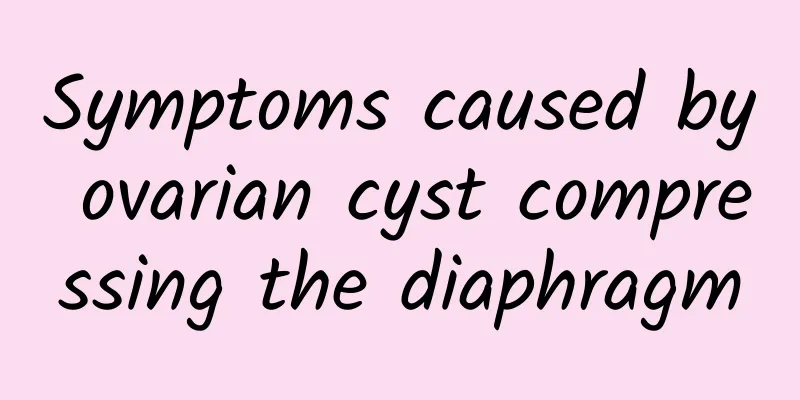Symptoms caused by ovarian cyst compressing the diaphragm

|
As ovarian cysts continue to grow and compress the diaphragm, patients may experience abdominal discomfort, difficulty breathing, lower limb edema, bladder, and other symptoms. Patients with ovarian cysts and large amounts of ascites may also experience such compression symptoms. Abdominal discomfort The weight of the ovarian cyst itself, as well as the influence of intestinal peristalsis and changes in body position, cause the ovarian cyst to move in the pelvic cavity, involving its pedicle and pelvic funnel ligament, so that the patient has a feeling of distension and heaviness in the lower abdomen or iliac fossa. When the cyst compresses the gastrointestinal tract, symptoms such as upper abdominal discomfort and loss of appetite may occur. trouble breathing Ovarian cysts gradually increase in size and can press upward on the diaphragm, resulting in limited diaphragmatic movement. The lungs cannot fully expand when the patient inhales, causing dyspnea. Some ovarian tumor patients experience dyspnea due to unilateral or bilateral pleural effusion. Such patients often have ascites. A large amount of ascites increases abdominal pressure, elevates the diaphragm, and reduces the lung contraction space, causing dyspnea. Lower limb edema If an ovarian cyst is fixed in the pelvic cavity, it may compress the iliac vein, resulting in poor venous return of the lower limbs, causing edema of one or both lower limbs. When the patient has a large amount of ascites, the intra-abdominal pressure increases, affecting the venous return of the lower limbs and causing edema of the lower limbs. Bladder and rectal compression symptoms When an ovarian cyst compresses the bladder, it can cause symptoms such as frequent urination, difficulty urinating, and urinary retention; if the ovarian cyst is located in the rectouterine pouch, it can compress the rectum and cause a feeling of falling or difficulty in defecation. |
<<: What should patients with uterine fibroids not eat?
>>: Foods that are beneficial for patients with vulvar leukoplakia
Recommend
How to treat left ovarian cyst
Treatment for a left ovarian cyst depends on the ...
What should I do if my period has not come after three days?
What should I do if my period has not come for th...
Several common transmission routes of adnexitis
Adnexitis is a gynecological disease that can be ...
Does cervicitis hurt?
Whether cervicitis will cause pain depends on the...
Medical treatments for menopause
We all know that if a woman suffers from menopaus...
What are the symptoms of ectopic pregnancy in early pregnancy
Ectopic pregnancy refers to ectopic pregnancy. In...
What are the symptoms of ovarian cysts?
Ovarian cysts are generally benign and can be cur...
What medicine can stop menstruation?
Drugs that stop menstruation do exist, but they n...
The main causes of cervical precancerous lesions
To treat cervical precancerous lesions, a diagnos...
What medicine should I take for cervical erosion?
Cervical erosion can generally be treated with me...
What are the typical symptoms of cervical erosion?
Cervical erosion is a common gynecological diseas...
What are the causes of uterine fibroids? These 5 types of people are most likely to suffer from uterine fibroids
Uterine fibroids are the most common benign tumor...
What is the incubation period of cervical warts?
Many people in our lives suffer from cervical war...
Must you avoid eating starch to lose weight? Ella Chen breaks the myth of white rice and maintains a good figure without reducing sugar
In recent years, the concept of "reduced sug...
Causes of cervical precancerous lesions in daily life
We must actively grasp the causes of cervical pre...









